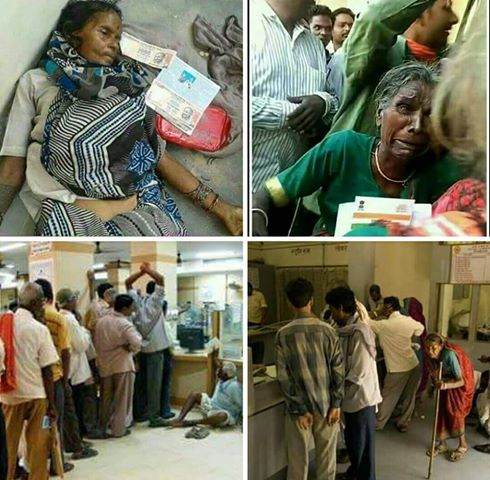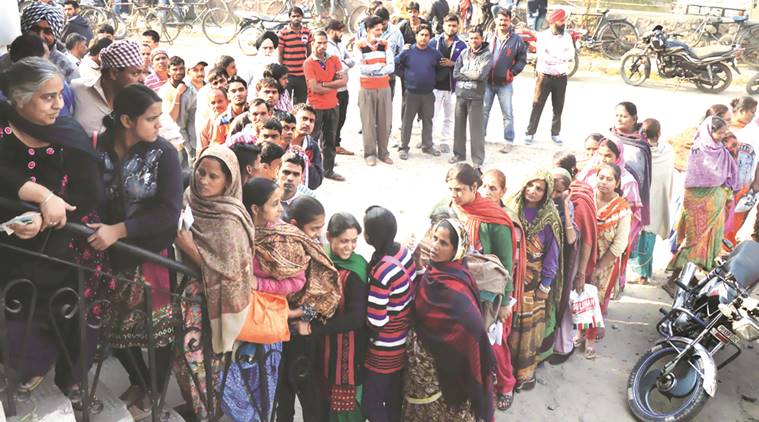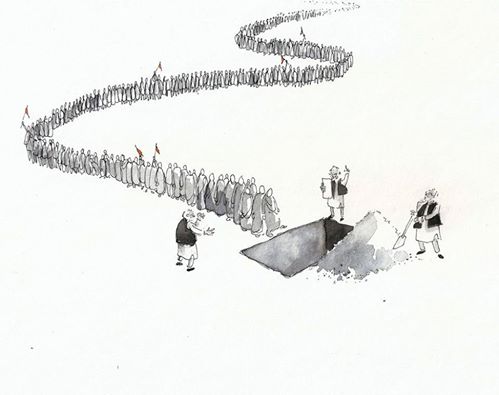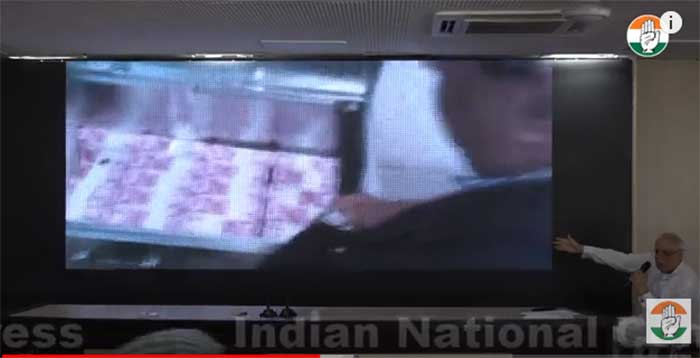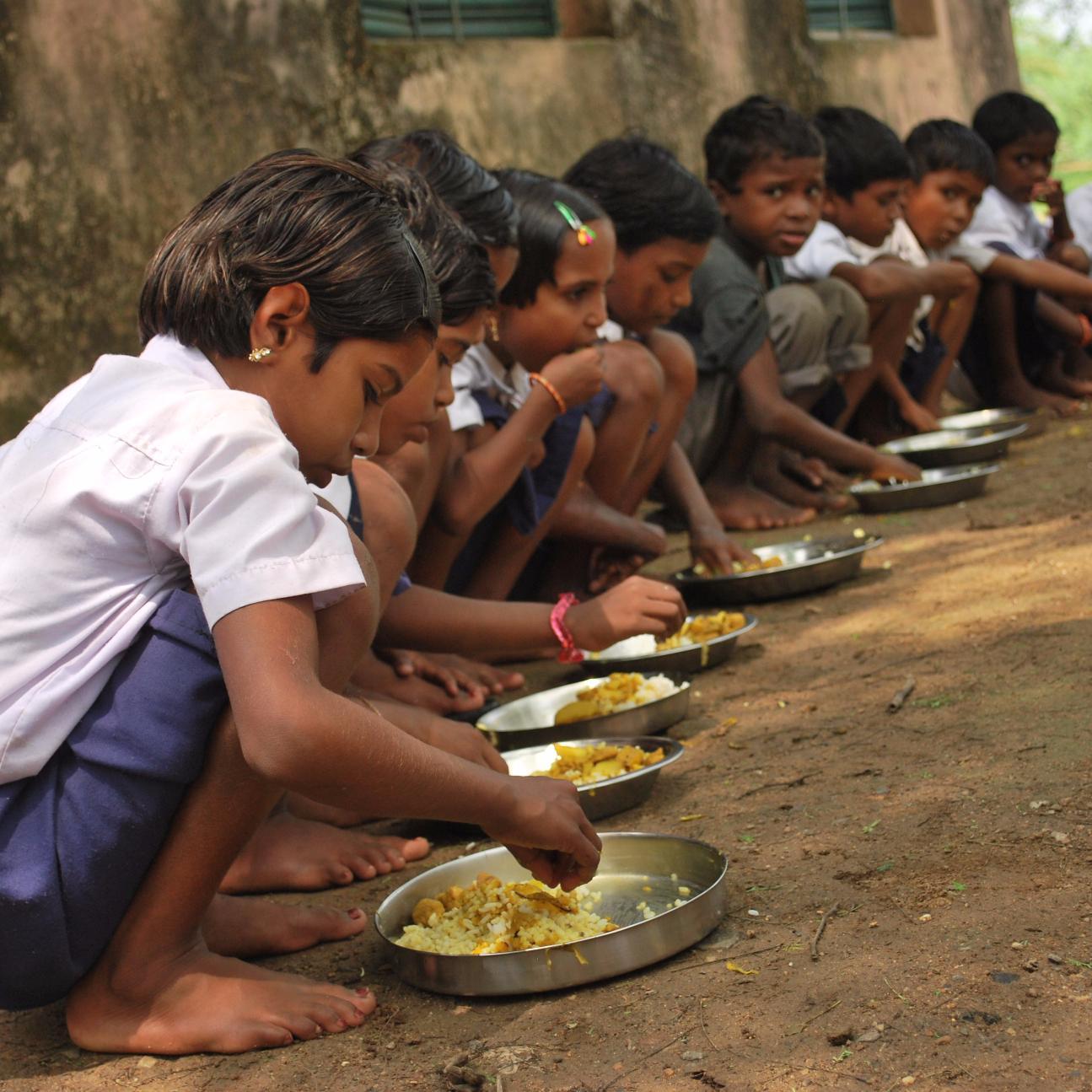
The right to food campaign is dismayed by the Indian government’s reckless attempt to renew currency notes, known as “demonetization”, without any serious attention to the consequences it may have for poor people. This move serves no clear purpose and is a major attack on the right to food and the right to life.
Demonetization was sold to the public by claiming that it would flush out the black economy. In a rare display of near-unanimity, economists of all persuasions have exposed this misleading claim. Illegal income is not usually held in the form of wads of cash. It is spent, invested, laundered or converted in other ways into safer and more profitable stores of value than currency notes. That is the main reason why the bulk of old Rs 500 and Rs 1000 currency notes have found their way back to the Reserve Bank of India during the last two months, contrary to the assumption that demonetization would leave crooks with large amounts of unusable notes. Another possible reason is that demonetization ended up enabling them to launder their black money by dispersing it into Jan Dhan and other accounts. The government is now planning to counter this by investigating millions of accounts and asking people to explain how they earned as little as a few lakhs of rupees. This will open the door to large-scale harassment, and perhaps also to the spread of corruption in the banking system. Meanwhile, the country’s big-time defaulters (powerful corporations that borrowed lakhs of crores of rupees from public sector banks) continue to get away scot-free.
Even as it makes a song and dance of demonetization, the government is showing no interest in other measures that are likely to be more effective in curbing corruption. Three years after the Lokpal Act came into force, no Lokpal has been appointed. Likewise, the Whistleblowers Protection Act (passed in February 2014) awaits implementation. In fact, the government has introduced amendments in Parliament to dilute these two Acts. It has also failed to reintroduce the Grievance Redressal Bill, which had support of all parties but lapsed with the dissolution of the Lok Sabha in 2014. And of course, political parties continue to evade financial transparency.
With the corruption narrative exposed, the government is now presenting demonetization as a step towards a “cashless economy”. Whatever the merits of cashless payment systems, blanket demonetization is a ridiculous way of promoting them. The main beneficiaries of this approach are the private companies involved in cashless payments. Never has state power been put so blatantly at the service of corporate interests.
While the social benefits of demonetization are limited and uncertain, its stupendous costs are becoming more evident every day. The ravage begins with more than 100 demonetization-related deaths – suffocation in bank queues, heart attacks, suicides and more. This massacre has caused astonishingly little concern in the corridors of power, where passing reference is made, at best, to the “inconvenience” faced by the public. And for every person who died, how many have fainted, fallen ill, gone hungry or sunk into depression?
Further, this is only the tip of the volcano. The big damage has only begun to unfold, as economic recession hits millions of vulnerable families. It does not require a PhD in economics to understand that when the bulk of the population is strapped for cash, economic activity and employment take a dip. Every day, fresh reports confirm that this is happening. Farmers have been dumping vegetables on the roads for want of a remunerative price. Traders and vendors have seen their sales dive, often by 50 per cent or more. Sales of durable goods have crashed across the board. Construction activity has slowed down. And most importantly, workers have been laid off on a large scale.
Other victims include pensioners and NREGA workers, who find it difficult to secure their meagre pensions and wages at the best of times. Now, with the banking system jammed, millions of them are in danger of their lifeline being cut off for weeks of even months.
The government’s reaction to this catastrophe is astonishingly smug. For one thing, it is claimed that the recession will be short-lived, and that the economy will bounce back very soon. It is in the nature of a recession, however, that getting out of it may not be easy. For another, the public is being asked to grin and bear it as long as the crisis lasts, without any measures being taken to protect people from insecurity and impoverishment. Instead of facing the crisis, the government relies on propaganda and public relations to deny it, and to give people an illusion that their suffering is a glorious contribution to the nation’s progress.
By way of partial compensation for the intolerable hardships being imposed on the people by this reckless and pointless demonetization drive, we demand: 1. Immediate increase of the centre’s contribution to social security pensions for widows, the elderly and disabled persons (under the National Social Assistance Programme) from Rs 200 per month to Rs 1,000 per month. 2. Immediate implementation of National Food Security Act provisions for universal maternity entitlements (Rs 6,000 per child). 3. Immediate central assistance for the inclusion of milk, eggs and fruits in school midday meals and ICDS. 3. Immediate increase in the annual NREGA budget to Rs 60,000 crores, with effect from 2016-7. 4. Immediate compensation for all families of victims of demonetization-related deaths. 5. Immediate reversal of all recent reductions in social spending by the central government, as a share of GDP. 6. Full disclosure of how, when, why and by whom the decision was made to demonetize.
These measures, aside from repairing some of the injustice that demonetization has done to the Indian people, will also help to avoid a prolonged recession by regenerating purchasing power. The right to food campaign stands in solidarity with all those affected by this irresponsible policy.
Steering Committee of the Right to Food Campaign:
National Networks: Kavita Srivastava and Dipa Sinha (Conveners – Steering Committee), Annie Raja, (National Federation for Indian Women), Colin Gonsalves , (Human Right Law Network), Aruna Roy, Nikhil Dey and Anjali Bhardwaj, (National Campaign for People’s Right to Information), Madhuresh, Arundhati Dhuru and Ulka Mahajan (National Alliance of People’s Movements), Asha Mishra and Kashinath Chatterjee (Bharat Gyan Vigyan Samiti), Ashok Bharti (National Conference of Dalit Organizations), Anuradha Talwar, Gautam Modi and Madhuri Krishnaswamy (New Trade Union Initiative), Binayak Sen (People’s Union for Civil Liberties), Subhash Bhatnagar (National Campaign Committee for Unorganized Sector workers), Paul Divakar and Asha Kowtal (National Campaign for Dalit Human Rights), Mira Shiva, Radha Holla and Vandana Prasad (Jan Swasthya Abhiyan), Ranjeet Kumar Verma, Prahlad Ray, Praveen Kumar, Anand Malakar (RashtriyaViklang Manch), Lali Dhakar, Sarawasti Singh, ShilpaDey and RadhaRaghwal (National Forum for Single Women’s Rights), G V Ramanjaneyulu, Kavita Kuruganthi (Alliance for Sustainable and Holistic Agriculture), Jashodhara (National Alliance for Maternal Health and Human Rights), Ilango (National Fishworkers Federation), Zasia, Sonam, and Noor Jehan (Bhartiya Muslim MahilaAndolan)
State Representatives: M Kodandram, Rama Melkape, VeenaShatrughana (Andhra Pradesh), Gangabhai and Samir Garg (Chhattisgarh), Abhay Kumar (Karnataka), Suresh Sawant, MuktaSrivastava (Maharashtra), Balram and James Herenj, Gurjeet Singh, Dheeraj (Jharkhand), Ashok Khandelwal, Shyam and Vijay Lakshmi (Rajasthan), Sachin Jain (Madhya Pradesh), Joseph Patelia, SejalDand, Neeta Hardikar and (Gujarat), Saito Basumaatary, RajuNarzari, BonditaAcharya and Sunil Kaul (Assam), Rupesh, (Bihar), V Suresh (Tamil Nadu), BidyutMohanty Raj Kishore Mishra, (Orissa), Sabina, Sunita, Devendra Gandhi, Kanhaiya and Mamta (Uttar Pradesh), Amrita Johri, Abdul Shakeel, Vimla, Koninika Ray and Rajender Kumar (Delhi), Fr Jothi SJ and Mr. Saradindu (West Bengal)
Individual Representatives: Manas Ranjan, Vidya Bhushan
Email: [email protected], Website: www.righttofoodcampaign.in Phone: 011- 41613468, +91 – 8527359760

